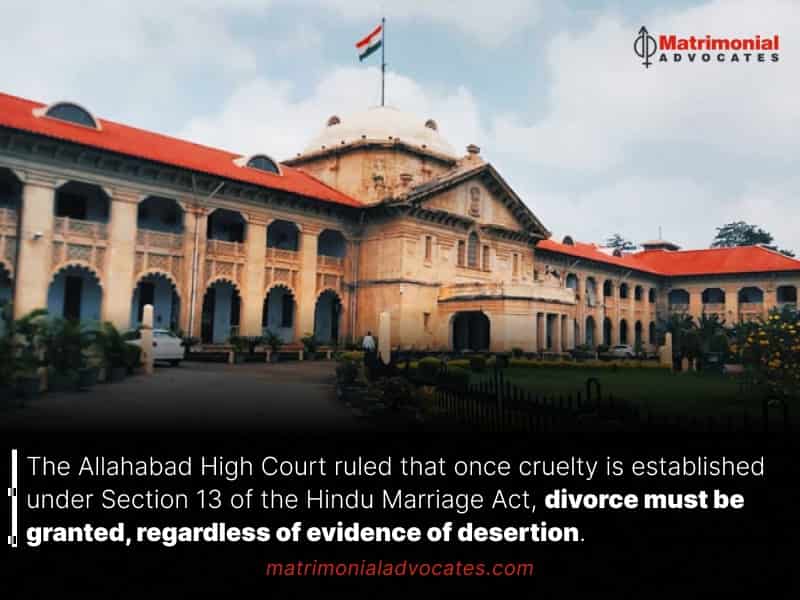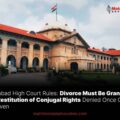
The Allahabad High Court emphasized that once the Family Court establishes cruelty, the marriage ought to be dissolved, regardless of whether desertion is proven or not. It underscored the separate and independent nature of the divorce grounds outlined in Section 13(1) of the Hindu Marriage Act. The Court stressed that the presence of any of these grounds mandates divorce, as they are distinct and not interdependent, as indicated by the use of “or” between them.
Section 13(1)(ia) of the Hindu Marriage Act, 1955 provides for divorce on grounds of cruelty. The state amendment of Uttar Pradesh to Section 13(1)(ia) provides for divorce when petitioner has been repeatedly or persistently been subjected to cruelty so as to “cause a reasonable apprehension in the mind of the petitioner that it will be harmful or injurious for the petitioner to live with the other party.”
“It has to be understood that each of these grounds are mutually exclusive to each other which is evident by use of the disjunctive ‘or’ to separate each ground from the other and there is no reason to read ‘or’ conjunctively as it will lead to absurdity. Thus, cruelty can by itself be a ground for dissolution of marriage. However, it seems that learned Family Court, after returning a finding that “cruelty” has been inflicted by the respondent-wife on the appellant-husband, refused to grant divorce to the husband presumably on the ground that the ground of “desertion” could not be proved by the appellant- husband.”
Background: In 1986, the couple exchanged vows and welcomed two sons. The husband alleged that his wife’s demeanor shifted unfavorably during her pregnancy, leading to mistreatment towards him and his parents. Despite living in the same household since 2003, they primarily communicated through their sons or via text messages. Consequently, the husband filed for divorce under Section 13 of the Hindu Marriage Act, 1955. Following this, the wife pursued various legal actions, including claims under the Domestic Violence Act, Dowry Prohibition Act, Section 125 CrPC, and a suit for restitution of conjugal rights under Section 9 of the Hindu Marriage Act.
Court Proceedings: Both the divorce petition (under Section 13) and the conjugal rights restoration suit (under Section 9) were jointly heard by the Family Court. Despite acknowledging cruelty, the court dismissed the divorce petition but ordered the restoration of conjugal rights. Dissatisfied, the husband appealed to the High Court.
Arguments: The husband’s legal representative contended that since the Family Court acknowledged the wife’s cruelty, granting divorce was warranted. He stressed that the wife’s non-contention of the cruelty allegations rendered the decision to compel the husband to remain married unjust. Additionally, he highlighted the lack of reconciliation attempts by the wife since their separation in March 2012, suggesting an irreparable marriage breakdown.
In contrast, the wife’s counsel asserted that she actively sought reconciliation and mere separation didn’t denote a marital breakdown.
High Court Verdict: The High Court observed that dismissing the divorce petition and ordering conjugal rights restoration, despite establishing cruelty, was inconsistent. It deemed the absence of desertion proof irrelevant. Emphasizing the distinct conditions for granting divorce under Section 13, the Court concluded that divorce should have been granted upon proving cruelty. The Court found the Family Court’s decision to direct marriage restoration contradictory, considering the established cruelty. It considered the cruelty finding sufficient to deny the decree of restitution under Section 9. Given the prolonged separation and failed reconciliation efforts, the Court determined the marriage as irreparably broken.
“There are bitter allegations of cruelty from both the sides and multiple litigations have taken place between the two in the last more than a decade. This embittered relationship between the appellant and respondent which has not witnessed any moment of peace for the last more than a decade or more is a martial relationship only on paper. The fact is that this relationship has broke down irretrievably long back.”
As a result, the High Court decreed the dissolution of the marriage between the parties, with the wife having the opportunity to seek alimony through independent legal proceedings.





